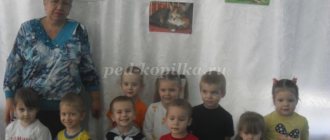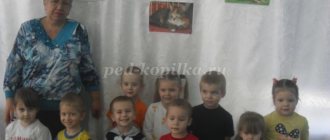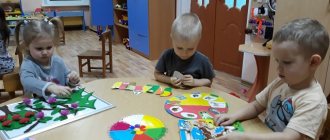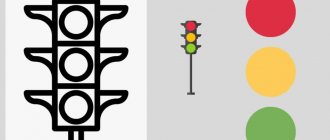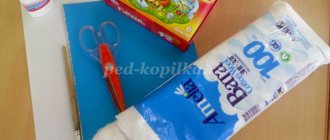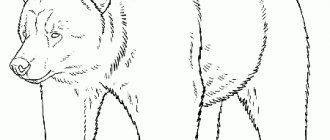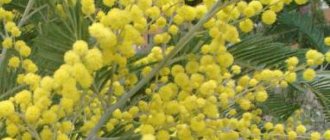Application “Kitten” for children of the 1st junior group
Lesson on applique for children of the first junior group of the kindergarten "Kitten"
The goal is to create a product of children's creativity - applique "Kitten"
–
introduce children to the content of a Russian folk song;
– learn to pronounce onomatopoeic words, answer questions about the content;
– teach techniques for working with paper and glue;
– form spatial representations – teach how to correctly position the kitten’s head, tail and bow.
EQUIPMENT: drawing - illustration for the song, cat toy, pictures of kittens, details for applique (head, tail, bow), paste, foam sponges, tape recorder, recording of the children's song "Kitten" »
V o s p i t a t e l. One animal came to see us today. It is soft and fluffy. But mice are afraid of him. Who is this? (Cat.) (Places a cat toy on the table.)
Main part. Reading a Russian folk song.
V o s p i t a t e l. Look how beautiful the cat is. No wonder they wrote a song about him:
The fur coat is very good
Bold eyes, white teeth.
The teacher shows the children an illustration of the song.
- Look at the picture. Who is pictured on it? (Kitty). What is the cat doing? (Children's answers, the teacher invites the children to touch the soft toy). What kind of fur coat does the cat have? (The cat’s fur coat is soft) Show where the cat’s eyes, whiskers, and teeth are. (Children complete the task). How does a cat meow? (Children pronounce onomatopoeia).
The teacher reads the nursery rhyme again, inviting the children to show on the toy what it says.
Children imitate the movements of kittens: they wash themselves, get on all fours, and arch their backs.
V o p i t a t e l (for children). Kittens came running to our cat. (The teacher lays out pictures of kittens). But did something happen? Look guys, what's wrong? (Children look at the pictures) Our kittens got wild and lost their tails, bows and heads. Shall we help the kittens? (The teacher lays out the details of the application). Where is our head? Here. (Children put the image of the head on the picture). Where is our tail? Here. (Children put the image of a ponytail on the picture). Now let's decorate our kitten? Let's tie a bow. Like this. (Children put an image of a bow on the picture). And so that our kittens do not confuse their tails and bows, we will glue them. Like this.
The teacher shows the kids how to apply paste to the image, spreading it with a foam sponge from the center to the edges in an even layer. Shows how to apply an image with the coated side to a sheet of paper, pressing it with the palm of your hand and smoothing it with a napkin or cloth. At the same time, he comments in detail on all stages of the work. Monitors the correctness of the actions performed and, if necessary, provides assistance (takes the child’s hand in his own and performs the action together)
Children's work is laid out on the table.
V o s p i t a t e l. Look how many kittens we got. How do kittens meow? (Meow! Meow!) How do they sing the song? (children's song "Kitten" is played)
The teacher calls the children and hugs them.
Application + kittens [Electronic resource] / Access mode: https://www.google.com/search?q=application + kittens Date of access: 08.09. 2021.
Children's song “Kitten” Electronic resource] / Access mode: https://www.youtube.com/watch?v=FH6pYV7JaWI Date of access: 08.09. 2021.
“Comprehensive classes according to the program “From birth to school” edited by N.E. Verasy, T.S. Komarova, M.A. Vasilyeva. First junior group. Volgograd; Teacher, 2012. (pp. 63-65).
Source
Paper applications
For the most exciting form of such leisure time and instilling initial creativity skills in preschool age, materials are usually prepared in advance.
The set of handy tools is already quite familiar: colored paper, glue, templates and scissors. Depending on the age category, simpler or more complex figures are chosen.
The principle of operation is as follows. The colored picture is cut into pieces, after which the child assembles it like a puzzle and pastes it onto a sheet of paper.
You can complicate the task by coloring the black and white image yourself, followed by cutting and sticking. This will make the process even more interesting.
As an alternative, you can create a separate representative of the fauna or a whole composition from prepared parts - torso, head, paws and tail. Showing patience and accuracy, the child tries very hard to create a unique image.
Pets
All kids know what the pets that live in grandma's house or yard look like. Older children know that, in addition to cats, dogs and rabbits, domestic animals also include cows, goats, sheep and horses.
By jointly remembering all the inhabitants of apartments and garden plots, you can make a beautiful applique.
Cat
Cut out the constituent elements: round head, oval body, paws, tail and ears from ¼ circle. The picture is assembled and painted. An adult can print geometric shapes on a printer in advance, and then build a kitten from the photo.
Dog
The figure is also not difficult, like the previous one. In addition to auxiliary materials, you will need blanks. The eyes, body and front paw are formed from ovals, the head from a whole circle, and the back paw and ears from halves.
Piglet
The body, legs, head, tail, ears are cut out of colored paper, and for the face: nose, eyes and snout. Children are asked to connect all the components and stick them on paper to create the appearance of a pig. It will look more fun if you make the tail voluminous.
Cow
Since at the age of 3-4 years it is quite difficult to cut out small details of the applique, you can use templates, which are subsequently glued onto a green sheet of paper.
The composition with a herd grazing in a meadow looks especially impressive. To prevent the process from seeming too labor-intensive, several cows are painted.
To improve perception, colors are selected for the background: light green, deep green or grass.
Applications with wild animals
They live in the thicket of the forest, so to see them you need to visit the Zoo. When going on an exciting journey, you need to have on hand: scissors, sheets of paper, glue, millet, felt-tip pens and animal figurines.
Bear
In our area, he is the real owner of the forest, so many children want to see him. Sequence of work:
- Pictures of a bear are distributed.
- Using a brush, carefully apply glue to the area where the body is located, precisely following the contour and without violating the boundaries of the design.
- Oatmeal is poured over the glue.
- Wait until completely dry.
The result is an applique extremely similar to Toptygin’s!
Chanterelle
It is best to assemble a fox with a bright fur coat from geometric shapes. The head and ears are triangle-shaped, and the tail, body and paws are oval. The eyes and nose on Patrikeevna's face are drawn with a felt-tip pen.
Bunny made from napkins
In the forests there are not only formidable predators, but also absolutely non-dangerous animals that feed on grass. Step-by-step instructions for the bunny:
- Take white napkins and tear them into small pieces.
- They are formed into balls.
- Bunnies are drawn using templates.
- The lumps are glued to the ears and body.
- The middle of the ears, tail and muzzle are decorated with cotton wool.
- At the final stage, a mustache is made from dark stripes.
This bunny can be placed on a postcard and presented as a gift!
Inhabitants of hot countries
All children are very inquisitive and always ask who is found on the distant southern continents. Using the appliqué technique, you can make exotic animals that you won’t find in your own forest.
Elephant
Typically, appliqué is done using blanks. First of all, the figure is cut out and then glued onto a piece of paper. To complete the composition, select a background that is suitable in color.
a lion
These animals live in the African savanna. Many children have seen live lions at the Zoo, so they can clearly imagine what this king of beasts looks like.
To make the lion cub really cute, you need to thoroughly prepare. You must have: black and red markers or felt-tip pens, PVA glue, a brush, scissors, sheets of yellow and orange paper.
Progress:
- The head and mane are cut out.
- The parts are glued together.
- An orange triangle imitating a nose is placed in the middle.
- They complete the look with eyes drawn at the top with a marker, and a mouth and cheeks at the bottom.
The almost finished craft is dried and set aside for a while. This applique can be used to decorate a greeting card or gift box!
Notes on the application in the second junior group “Pets. Cup for a kitten"
Lyudmila Tikhonova
Notes on the application in the second junior group “Pets. Cup for a kitten"
Notes on application in the second junior group
on the topic " Pets"
«Kitten cup»
.
Tasks: correctly stick the bowls next to the kitten , assign the names of pets and their cubs , and their distinctive features. Develop orientation in space. Fix primary colors. Practice onomatopoeia and imitation of movements. Develop the articulatory apparatus ( “like a cow chews”
,
“as a dog shows its teeth”
, adjust the volume of the voice (how a large
animal makes sounds , and like a baby, develop fine motor skills of the hand; attention, memory.
Cultivate interest in the application , responsiveness, empathy for the characters, accuracy.
Equipment: house - dog house, dog and puppy toy, toy bone, cow and calf toy, artificial grass mat, cat in a basket, kitten toy, napkins , glue, rags, base with a picture of a kitten .
Brief progress of activities.
1. Org. Moment ( the kitten , he is lost, looking for his mother)
2. Children help the kitten find its mother , meet pets , ask what they eat, what sounds they make.
3. The teacher demonstrates and explains the stages of work.
4. Finger game: “Kittens”
5. Independent work of children.
Application in the second junior group “Rug for a kitten”
Lesson notes on application
"Rug for a kitten ." in the younger group
Program content:
teach children to use glue and spread it on the wrong side;
apply the glued side to the paper, and face up and smooth it with a napkin;
consolidate knowledge about primary colors (red, yellow, blue, green);
consolidate the names of geometric shapes, the ability to correctly pronounce their names;
teach yourself how to make patterns from geometric shapes;
cultivate a love for animals;
generate interest and a positive attitude towards the application.
Materials:
blanks of geometric shapes from colored paper; prepared mats made of colored cardboard, cut at the edges with fringe; glue stick; napkins and oilcloths; kitten toy.
Progress of the lesson
Riddle game "Kitten"
Vos-l:
-Who lives there little, (shrug) In the morning he gets up early, (stretch) drinks milk from a saucer, (“lap” milk from his palm) Likes to wave his tail, (show his tail with his hand) Wash his face with his paw. (wash) Who is this?
Children:-
Kitty!
Vos-l:
-A kitten came to visit us, but he was very sad. It's his birthday today. Nobody gave him anything. After all, it is customary to give gifts on birthdays. Let us make him a beautiful rug as a gift so that he can sleep on it.
Vos-l:-
Here I have multi-colored cardboard. I will give everyone a different color. This is a future mat for a kitten that needs to be decorated. What color is each?
Children:
Green, red, blue.
Vos-l:
-I have prepared a decoration for your rug, these are geometric shapes. Let's name them.
Children:
-Circle, square, triangle.
Vos-l:
-Well done! To make the rug beautiful, you need to glue them. Everyone has glue. Take one figurine, turn it over with the colored side down and spread it with glue. Now we apply the figure to the cardboard, press it with the palm of our hand and smooth it with a napkin. Let's all decorate the rug together.
Children work with the help of a teacher.
Vos-l:
-Kitten, did you like the guys’ rugs? The kitten really liked the rugs, he thanks you and invites all the guys to play with him. You and I will be mice and go to visit the Kitten, and he will catch up with us.
Game "Gray Mice"
Kitty, kitty, stop sleeping. We came to you to play. Don't sleep, let's get up, catch up with the gray mice!
(The game is repeated 2 times)
Vos-l:
-The kitten really enjoyed playing with you, he says thank you very much for the beautiful rug.
Publication address:
Progress of activities:
1. Org. moment. The teacher pays attention to the kitten's . ( A kitten )
2. The kitten is lost and doesn’t know where its mother is. The teacher and the children are looking for their mother. (They meet different pets and ask them . The animals show their babies, draw the children’s attention to what sounds their babies make, what they eat, and what they look like.)
- Guys, who is this? (Points to the dog at the booth)
.
(Answers)
- What is the name of the dog’s house? (Answers)
.
Dog (voiced by the teacher)
asks what happened?
The children say that a kitten , isn’t it the dog’s son?
- Thanks, guys, do you know what he likes to chew on? (Answers)
You'd better ask the cow, maybe this is her baby.
How does a cow moo? (Answers, imitation of sounds)
.
- Cow, isn’t it your baby who got lost?
- No, this is not my baby. Here's my baby. Do you know what it's called? (Answers)
.
He hums like this. (Shows children imitating)
.
- That's right, calf. He, like me, loves weed, we chew it like this. (Guys imitate the movement)
.
– Ask the cat. (The children move on, there is a cat in the basket. The children say hello, the kitten meows quietly).
– My kitten is such a prankster !
has it in a cup
Two grouse have arrived
Leave your comment
Reading time: 1 minute
Rosobrnadzor: almost half of teachers do not reach the basic level of training
Reading time: 2 minutes
All-Russian student graduation will take place on July 10
Reading time: 2 minutes
Early start of classes negatively affects student performance
Reading time: 2 minutes
An Italian teacher gave children a summer assignment and became famous
Reading time: 4 minutes
Children perceive voice assistants as living beings
Reading time: 3 minutes
Gift certificates
Responsibility for resolving any controversial issues regarding the materials themselves and their contents is taken by the users who posted the material on the site. However, the site administration is ready to provide all possible support in resolving any issues related to the work and content of the site. If you notice that materials are being used illegally on this site, please notify the site administration using the feedback form.
All materials posted on the site were created by the authors of the site or posted by users of the site and are presented on the site for informational purposes only. Copyrights for materials belong to their legal authors. Partial or complete copying of site materials without written permission from the site administration is prohibited! The opinion of the administration may not coincide with the point of view of the authors.
Source
